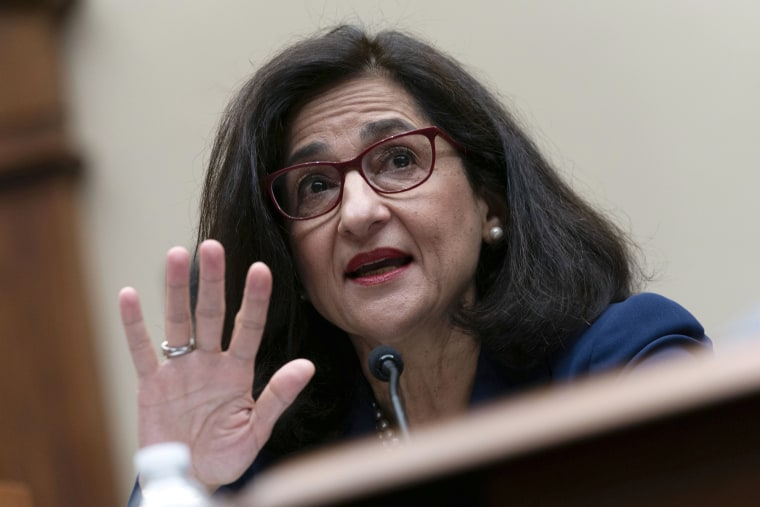Columbia University’s president said Monday that talks with student organizers have failed to reach an agreement, and the university will not divest from Israel — a demand that has sparked protests on college campuses across the country.
Minouche Shafik asked for those in encampment protests on campus to voluntarily disperse, saying the demonstration has created “an unwelcoming environment for many of our Jewish students and faculty,” that “external actors” have contributed to a “hostile environment” around university gates, and it has made a “noisy distraction” for students.
Shafik also cited the upcoming commencement, saying, “We also do not want to deprive thousands of students and their families and friends of a graduation celebration.”
 Columbia University President Minouche Shafik testifies on Capitol Hill on April 17.Jose Luis Magana / AP
Columbia University President Minouche Shafik testifies on Capitol Hill on April 17.Jose Luis Magana / AP
Columbia was the first elite institution where an encampment protest in support of the Palestinian cause was held, demanding the school divest from investments in weapons manufacturing and supporting Israel amid the backdrop of the Israel-Hamas war that has seen more than 34,000 people killed in the Gaza Strip.
Protests spread quickly last week on campuses from coast to coast, and have also resulted in mass arrests and crackdowns.
“While the University will not divest from Israel,” it offered to create an expedited timeline for a review of new proposals from students by the school’s Advisory Committee for Socially Responsible Investing, which explores divestment, Shafik said.
Recommended
“The University also offered to publish a process for students to access a list of Columbia’s direct investment holdings, and to increase the frequency of updates to that list of holdings,” she added.
Though the talks have resulted in a stalemate and the Columbia protest is now two weeks into its stay on campus, there appear to have been some small movements in negotiation.
Shafik said the university offered “to make investments in health and education in Gaza, including supporting early childhood development and support for displaced scholars.
“We urge those in the encampment to voluntarily disperse. We are consulting with a broader group in our community to explore alternative internal options to end this crisis as soon as possible. We will continue to update the community with new developments,” she said.








